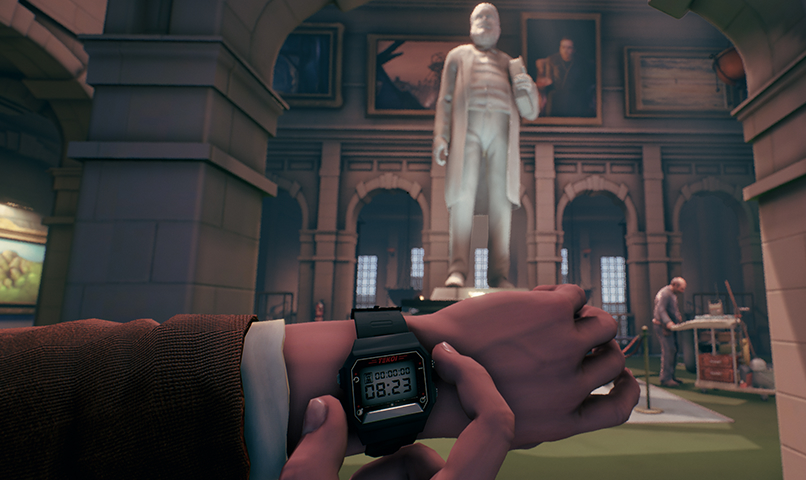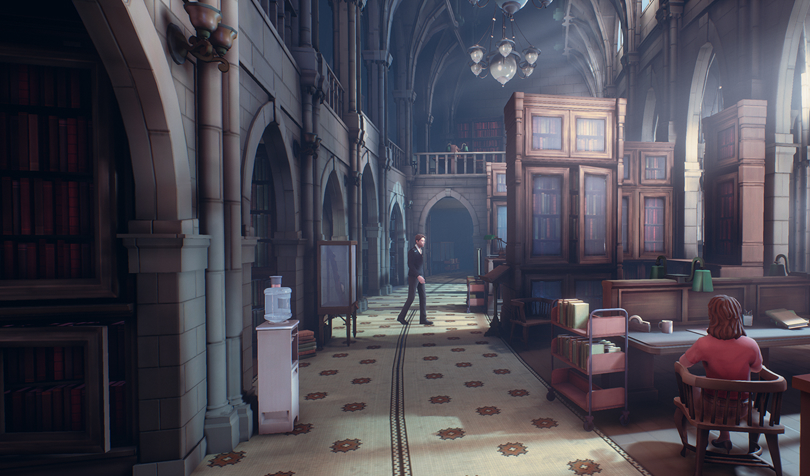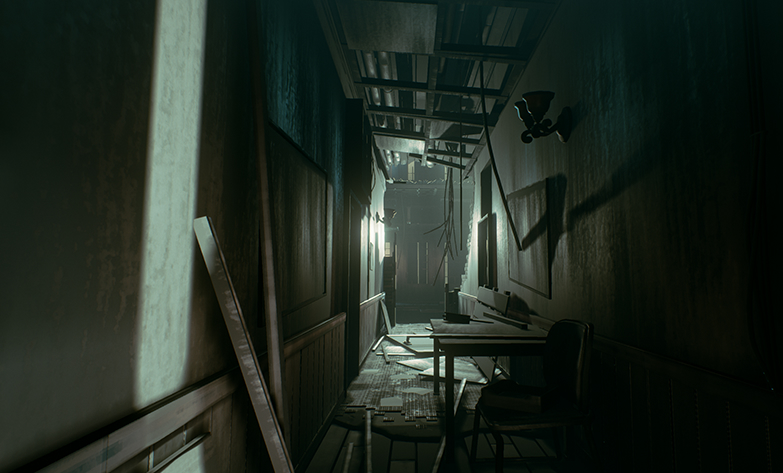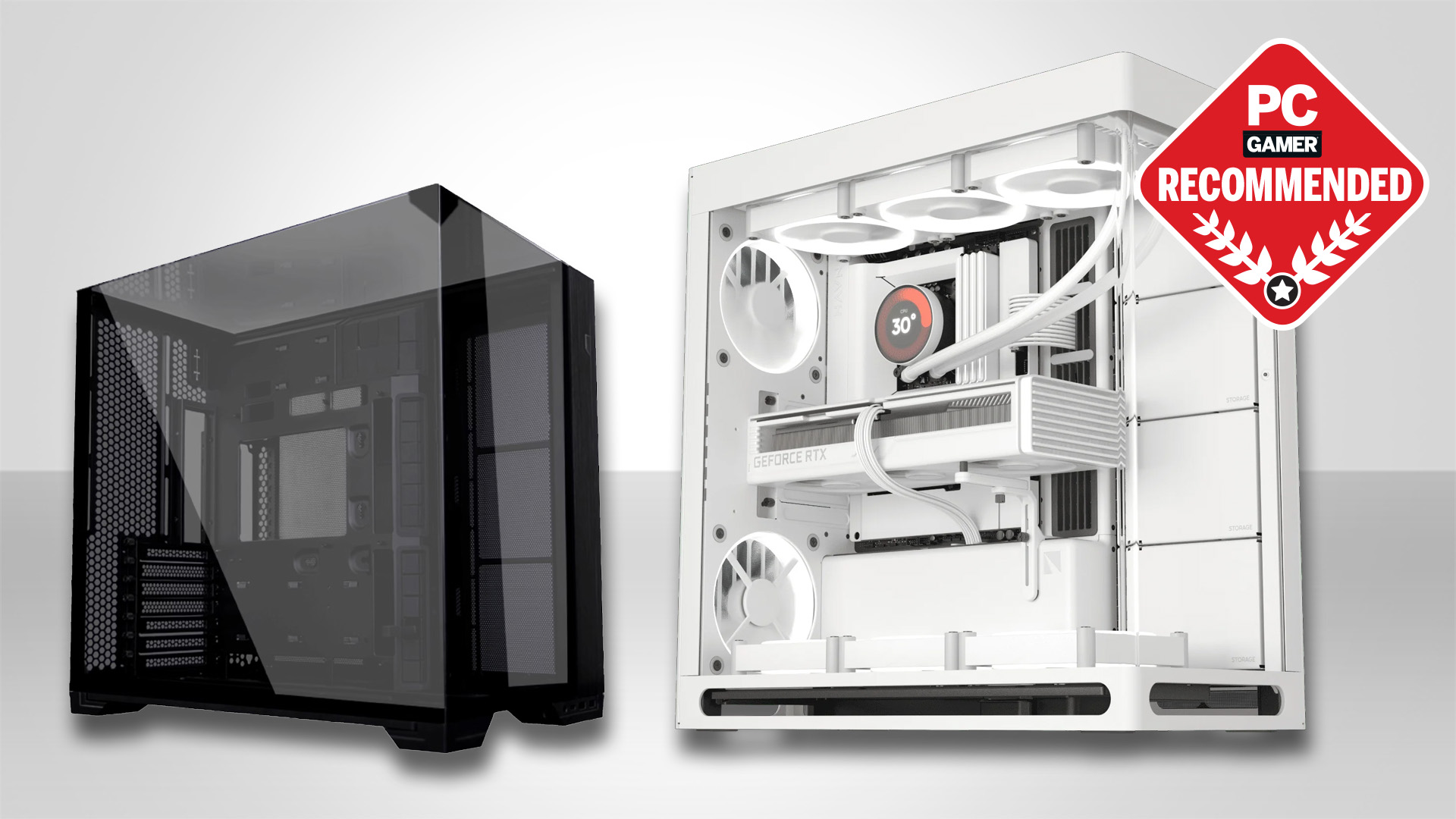The Occupation is a politically-charged thriller that pits you against the clock
An early look at White Paper Games' thought-provoking new narrative game set in the universe of Ether One.
Upon entering the grand white sandstone government building I'm met with a security door. To my left lies a waiting area that houses a rack of postcards, a couple of well-worn leather couches and a cigarette machine. To my right, behind a wall of perspex, sits a guard nonchalantly chatting aloud to himself. I ring a buzzer to grab his attention and he asks that I place my suitcase on the conveyor belt that shuttles between reception and his office.
The guard checks my bag, introduces himself as Steve, and hands me a keycard which I choose to stick in my case for safe keeping. Steve then asks me to run the key through the security door and join him in the main foyer ahead. I unsuccessfully fiddle around with some buttons as I attempt to arm myself with the card before I realise I've left my luggage behind. I nip back, grab it, place it down, pop it open and voila—my keycard is right where I left it.
"The case in Ether One is actually a literal case that you go into and see everything before you," the game's artist Scott Wells-Foster tells me. "In The Occupation, however, we have a briefcase that in essence does the same thing but in a more practical way. It's designed to give everything in the game a little more credibility—it's the same with the watch mechanics and how you check time as it progresses in real time in-game."
It may sound simple, but the fact that The Occupation—White Paper Games' follow-up to the wonderful Ether One—requires you physically access your briefcase and leaf through your belongings so as to initiate your inventory screen is a brilliant idea. In a game where gathering a multitude of items, documents and passwords is key, the act of hoarding and determining each component's worth in real-time lends the process a sense of credibility—that your decisions on what to keep, discard and/or collect really do matter.
Set in late 1987 within the same wider universe as Ether One, The Occupation sees you playing a journalist who, as a result of his investigative credentials, has the power to make or break The Union Act—a "controversial act which threatens the civil liberties of the British population" in the wake of a terrorist attack. Needless to say, the UK as it stands is in turmoil thus much rests on your shoulders, and with just four hours—which play out in real-time—to determine the country's standing you'd best act fast.
Despite playing a pre-alpha build, it's clear from the outset that The Occupation has ideas and ambitions far grander than its thought-provoking forerunner. First off, The Occupation features multiple idiosyncratic characters who harbour their own religious and political views, all of which feed into the game's central narrative.
The aforementioned Steve, for example, is a failed actor who is caught reading aloud lines for an audition when we first meet. He's American, and is thus further removed from the game's politics compared to its other characters. After passing through security we meet Dan, a Scottish Muslim and "towering bald man who screams security". Wells-Foster tells me that the decision to highlight Dan's religion was not so as to align it with the game's overarching themes, but was instead to humanise the character within his environment.
Keep up to date with the most important stories and the best deals, as picked by the PC Gamer team.
"The fact that he is a Muslim man means he'll pray at certain times, and when he wants to go and pray he'll leave his desk," says Wells-Foster. "He goes from being really secure, to more of a vulnerable religious man. You can take advantage of this situation should you wish, or not—it depends on what kind of person and player you are."
This idea of choice and seeking out circumstantial scenarios is central to my short playthrough of The Occupation. When instructed by Dan to meet with a counsellor a few floors up the government building at a specified time, I instead peel off and begin snooping around empty offices, uncovering confidential documents and hacking computer databases. Before long, I'm in touch with a mysterious woman who begins guiding me around one floor—which eventually sees me crouching through crawlspaces and squeezing between plasterboard walls.
At one point I catch a glimpse of Steve's flashlight who's clearly onto me. And suddenly the 1980s timeframe makes sense.
"We chose the '80s because of how mechanical things were then and how straightforward they were," Wells-Foster explains. "Take for example the security guards. If I go into a room and blow the fuse, the security guard is going to come in because he knows the room. But he doesn't have cameras there, he has to manually go and check. He then goes to check, but meanwhile you've left that room and can then access his now vacant room. We could have set the game now, but from a technological perspective, the security guard in the aforementioned scenario would know exactly where you are straight away."
Despite its leanings towards autonomous exploration, though, The Occupation does have a set story with a defined start and end. Wells-Foster tells me that depending on your actions, there's as much scope for you to prevent the Act being passed as there is for it succeeding. You might get caught by Steve or Dan or any other of the game's characters I'm yet to discover, for example, which against a real-time countdown will naturally set you back.
"That can happen an hour into the game, two hours into the game, however long," adds Wells-Foster. "We do have a narrative and that'll be spliced in between all of the game's exploration and discovery. We see it as: gameplay, set piece, gameplay, set piece, and so on—it depends how far you get into it, with in turn applies to how you see the characters. By exploring on your own you serve to learn more about other characters - you have that backstory to drive forward."
As I'm sure you're aware, themes of terrorism, immigration and controversial political acts are not too far removed from modern day society. White Paper Games is of course well aware of this too, however Wells-Foster doesn't see The Occupation as a reflection of real life but instead views it as a jumping off point to initiate a discourse—both outwith and within the game.
"We aim to target the grey area in people," he says. "Even if someone is right wing, for example, that doesn't mean that they're right wing and that's just how they are, it's because of fundamentals that have happened in their life and the society in which they live. You can't just judge someone just because of their beliefs. You can disagree with them as a person, but not necessarily with how they've lived and come to these conclusions as that's unique to them."
Wells-Foster continues: "Every person that you meet or see in The Occupation, the reason they have character and different things behind them is because we wanted to see that in a game. We didn't feel you see that often enough in games. And we also wanted the game to feel British—Britain is so multicultural and we're trying to show that and give what we think each character would think and what each character would feel. It's then up to you to decide whether that character is right or wrong because that's what you believe in as yourself and not what we're trying to tell you what is right or wrong."
At 18 months into development, The Occupation has a ways to go before release however has definitely piqued my interest so far. Its painterly Pixar-meets-BioShock art style is gorgeous, and its socio-political themes are as thought-provoking as they are intriguing. If you're a fan of narrative-led exploration games, I'd stick this one high on your upcoming games list—particularly if you enjoyed White Paper Games' last outing Ether One.
The Occupation is without a hard release date for now, however is targeting a late 2017 launch.





